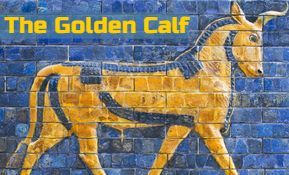
Shoftim: No Bribery!
Not being attuned to religious issues at the time, I didn’t give much thought to the point my biology professor was trying...

Intelligent Design
“And you shall not accept a bribe, for a bribe will blind the eyes of the wise and make just words crooked” (Devarim 16:19).
Thirty-two years ago, the professor of my undergraduate biology course prefaced his remarks about biological adaptations by saying: “We don’t ask the teleological why.”
The teleological argument for the existence of God, inferring a Designer from the complexity of biological entities, is currently touted as intelligent design, although its proponents would be quick to assert that intelligent design is not creationism.
Not being attuned to religious issues at the time, I didn’t give much thought to the point my biology professor was trying to get at.
However, when I entered a Baal Teshuvah Yeshivah four years later I was astounded to find intelligent, well-educated people who challenged naturalism and its principal brainchild, evolution.
Is there sufficient evidence in the design of the world around us to conclude that there must be an Intelligent Designer? If so, why doesn’t most of the word recognize this evidence?
In an essay on faith, Rabbi Elchanan Wasserman deals with this issue. He begins by asking a number of questions: How can the Torah command us to believe in Hashem, something that is seemingly connected to the emotions? How can a child be required to believe in Hashem at age 12 or 13 when even the greatest philosophers have failed to grasp the truth?
He answers that if you think about it, you will realize that “the belief that the Holy One created the world is self-understood by any intelligent being — unless a person is a complete imbecile. And there is no need for any knowledge of philosophy to grasp this principle.”
Rabbi Wasserman cites the author of the Duties of the Heart (Shaar HaYichud 6), who writes:
There are people who say that the world came into existence by chance, without a Creator who caused it and formed it. I wonder how any rational being in a normal state of mind can entertain such a notion. If one holding such a opinion would hear a person expressing a similar view in regard to a water-wheel that revolves in order to irrigate a portion of a field or garden — and were to say that he thinks it had been set up without any intention on the part of a mechanic who labored to put it together and adjust it, using all his tools to obtain this useful result — the hearer would wonder, be exceedingly astonished, and think the man who made such a statement extremely foolish. He would promptly charge him with lying, and would reject his assertion.
Now, if such a statement is rejected in regard to a small and insignificant wheel, the fashioning of which requires but little contrivance and which serves for the improvement of but a small portion of the earth, how can anyone permit himself to harbor such a thought concerning the immense sphere that encompasses the whole earth with all the creatures on it; which exhibits a wisdom so great that the minds of all living creatures, the intellects of all rational mortals, cannot comprehend it; which is appointed for the benefit of the whole earth and all its inhabitants – how can one say that it came into existence without a wise and mighty designer purposing and conceiving it? Whatever takes place without purpose shows, as is well known, no trace of wisdom or power.
Rabbi Wasserman continues: “How could anyone say that the universe came into existence on its own, seeing that everywhere we look we see signs of such inconceivably profound wisdom? How wondrous is the wisdom and design in the human body, how wondrous the arrangement of its limbs and organs, as all doctors and surgeons attest. How is it possible to say, with regard to such a wondrous machine, that it came into existence on its own without a purposeful designer? If anyone would claim that a watch had just come into existence on its own, he would be considered insane” (Kovetz Maamarim).
Rabbi Akiva and the Heretic
The Midrash presents the argument from design as the only argument for God’s existence that appears in the entire Talmudic literature:
A heretic asked Rabbi Akiva, “Who created the world?”
Rabbi Akiva answered, “The Holy One.”
The heretic challenged Rabbi Akiva, “Show me proof.”
Rabbi Akiva retorted with a question. “What is that you are wearing?”
“A piece of clothing,” the heretic replied.
“And who made it?” Rabbi Akiva continued.
“The weaver,” he replied.
“Show me proof!” Rabbi Akiva demanded.
The quote continues, but at this point it is important to note that Rabbi Akiva did not answer the heretic’s challenge for proof! He seemed to be returning the challenge: “You are challenging me to prove something to you, try and prove something to me.”
No doubt, an intellectual giant as great as Rabbi Akiva could easily rebuff any argument the heretic might come up with.
Rabbi Akiva seems to be teaching us with his behavior that there is no benefit attained from debating the heretic. For the reality is that if a person does not want to accept a certain conclusion, no arguments or proofs, no matter how compelling, will be able to convince him.
Then Rabbi Akiva spoke to his students: “Just as a garment testifies upon a weaver, and a door testifies upon a carpenter, and a house testifies upon a builder, so too the world testifies that the Holy One created it. (Midrash Temurah in Midrash Aggados Bereishis).
Looking at the complexity of the universe and the living organisms it contains leads us to conclude that there must be a Designer behind it all. Rabbi Elchanan Wasserman writes that every human being would instantly reach this intuitively obvious conclusion were it not for accepting the “bribe” of arrogance and physical desires, a bias known in psychology as cognitive dissonance.
The Heart Takes the Bribe
In Rabbi Wasserman’s words: “The resolution of this enigma can be found in the Torah. The Torah reveals something profound about human psychology when it commands: ‘And you shall not accept a bribe, for a bribe will blind the eyes of the wise and make just words crooked’ (Devarim 16:19).
“What is bribery? In legal terms, the smallest amount necessary to constitute a bribe is a ‘shaveh prutah’(not much more than a penny), similar to the minimum amount needed [for a court] to find a person guilty of stealing or of taking interest. This negative commandment, not to take a bribe, is directed not only at a judge, but at every man, even the wisest of men, even the most righteous, even Moshe (Moses) himself. Yes, if it could be imagined, even if Moshe would take the tiniest bribe, a prutah, his perception of reality would be distorted; he would be incapable of bringing forth a just ruling.
“At first sight, this is nothing short of amazing. Can we imagine Moshe or Aharon (Aaron) twisting the law and judging falsely merely for the sake of receiving such miniscule benefit? But the Torah itself testifies to the possibility, and ‘the testimony of God is trustworthy’ (Tehillim 19:8).
“We must therefore say that it is a psychological law: A person's will or desire [to gain some benefit] influences his mind [his ability to think straight]. Of course, it depends how strong the desire and how resolute the mind. A small desire will not exert much influence on a great mind, whereas on a lesser mind it will. A powerful desire [for gain] will exert even more influence. One thing is certain: no matter how miniscule, a desire for gain will always have some affect. Even the tiniest desire can cause the greatest mind to waver a fraction.
“This is exemplified in the Talmud (Ketuvot 105b):
Rebbi Yishmael bar Yossi had a land tenant who used to bring him fruits from his [R. Yishmael's] orchard every Friday before Shabbat. Once, he came on a Thursday. R. Yishmael asked him: “What's changed this week?”
“I have a court case this week,” he answered. “Since I was coming to town anyway, I thought I would bring you your fruits.”
R. Yishmael refused to take the fruits [even though they were his]. “I am disqualified from judging your case.” Two [other] rabbis sat and began to hear the land tenant's case. R. Yishmael sat [on the sidelines] watching. At every turn in the discussion, R. Yishmael felt himself wanting to give advice to his land tenant. “If only he would say this now… if only he would say this…”
After the case was decided, he exclaimed, “O that the spirit of those who take bribes would explode! I refused to take what was rightfully mine [and I still couldn't help being biased and wanting to see him come out winning]. How much more those who actually take what is not theirs!”
“It is known that the sages [of the Talmud] were angelic in terms of their expanded consciousness and saintly character. We nevertheless see that the smallest degree of bias could cause them to incline away from the truth. How much more so the rest of us who are sunken in the desires of this world!
“The desire for gain literally bribes us, saying, ‘Hey, look, the world is free to do with as you please!’ How powerful this bias is! How easily it distorts our perception and blinds us! For when a person has ‘bought into’ a certain bias, he is incapable of recognizing any truth that contradicts that bias. As far as that truth is concerned, he might just as well be in a drunken stupor. He doesn't recognize its existence.
“Now, of course, we shouldn't be astonished that so many great philosophers had difficulty believing that the world was created by a Purposeful Creator. Their minds were surely great, but their desire to gain benefit from the pleasures of this world overcame their ability to think straight. Such a powerful bias can divert a person's mind to the point that he can say two plus two does not equal four, but five.
“A person cannot judge whether something is true unless his mind is free from any distorting influence about the thing he wishes to judge. On the contrary, if recognizing a particular truth in any way contradicts a bias that a person has bought into, no amount of intellect, even the intellect of a great person, can remove or overcome that bias.
“If so, the root of God-denial lies not in the distortion of the intellect in and of itself. It lies in the heart, i.e., in one's desire to gain benefit [from this world], which distorts and blinds the intellect.
“And the commandment to believe in God? It is a commandment not to allow one's desires to overcome his intellect so that he will automatically come to believe. In other words, there is no need to struggle to believe. One must simply remove the obstacles that stand in the way of believing. It will then come naturally, of itself…” (Kovetz Maamarim).
This is why Rabbi Akiva presented the argument from design to his students but not to the heretic. The heretic was not coming with an open mind; he had the attitude that “my mind is made up, don’t confuse me with facts.” He was in the grips of cognitive dissonance.
We have to remove the ‘bribe’ of our physical desires and previously held conceptions, and come as truth seekers with a sense of openness to hear another point of view. Then we will be able to recognize truth when we hear it.











Tell us what you think!
Thank you for your comment!
It will be published after approval by the Editor.